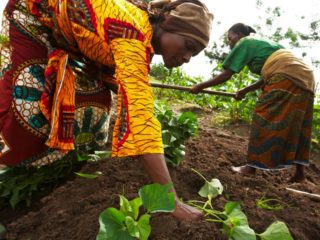Report lists ways of securing the future of cattle production in Africa
A 'world-first' study of the
genomes of indigenous cattle in Africa has revealed vital clues that will help
secure the future of cattle production on the continent, said a report released
by the University of Nottingham yesterday.
 The report said scientists in
England and East Africa mapped the genomes of five breeds of African cattle to
help inform future breeding programmes and stop indigenous cattle from dying
out. The scientists include Professor Olivier Hanotte from The University of
Nottingham and the International Livestock Research Institute (ILRI) in
Ethiopia, with Professor Heebal Kim from Seoul National University.
The report said scientists in
England and East Africa mapped the genomes of five breeds of African cattle to
help inform future breeding programmes and stop indigenous cattle from dying
out. The scientists include Professor Olivier Hanotte from The University of
Nottingham and the International Livestock Research Institute (ILRI) in
Ethiopia, with Professor Heebal Kim from Seoul National University.
Professor Olivier Hanotte said:
"This paper is important because it is the first time that the genome of
African cattle has been studied in detail. The results will better inform
breeding and crossbreeding programmes to improve cattle productivity and
resilience in sub-Saharan Africa and crucially preserve the genetic diversity
of the species.
“The African continent is now
witnessing major transformations of its agricultural systems and rapid loss of
indigenous livestock. Unfortunately, the opportunity to explore this treasure
trove of diversity may not last for very much longer as current random breeding
programmes mean some of that diversity will be lost."
Dr Jaemin Kim, joint first author
of the paper said sequencing and analysing the genome of these African breeds
has been a unique journey of discovery: "For the first time we have been
able to pinpoint at fine scale genome regions involved in the unique adaptation
of African cattle."
Cattle are an increasingly
important resource in Africa as sustainable sources of food, milk, traction and
manure. With its human population growing and the economy and subsequent wealth
predicted to expand greatly, there will also be a huge increase in demand for
livestock.
Scaling up livestock production
is a big challenge in Africa partly because of the varying climates but also
because of infectious and parasitic diseases. Since their introduction to the
continent thousands of years ago from their centres of origins in the Near East
and the North of the Indian subcontinent, African cattle breeds have gradually
become genetically adapted to cope with their varying environments from the
Sahelian desert to the sub-humid tropical forest and it is these useful
adaptations that the team has identified.
 There are around 150 breeds of
cattle in Africa so the research team chose five distinct breeds that represent
the genetic diversity of the species over a wide geographical area. Professor
Hanotte said: "We analysed the genome of each animal and looked for what
they were good at (e.g. coping with hot weather, infectious disease
resistance). We then generated a catalogue of genetic variants in our five
breeds and identified the unique regions in the genome of each breed that gives
them an advantage."
There are around 150 breeds of
cattle in Africa so the research team chose five distinct breeds that represent
the genetic diversity of the species over a wide geographical area. Professor
Hanotte said: "We analysed the genome of each animal and looked for what
they were good at (e.g. coping with hot weather, infectious disease
resistance). We then generated a catalogue of genetic variants in our five
breeds and identified the unique regions in the genome of each breed that gives
them an advantage."


Comments
Post a Comment